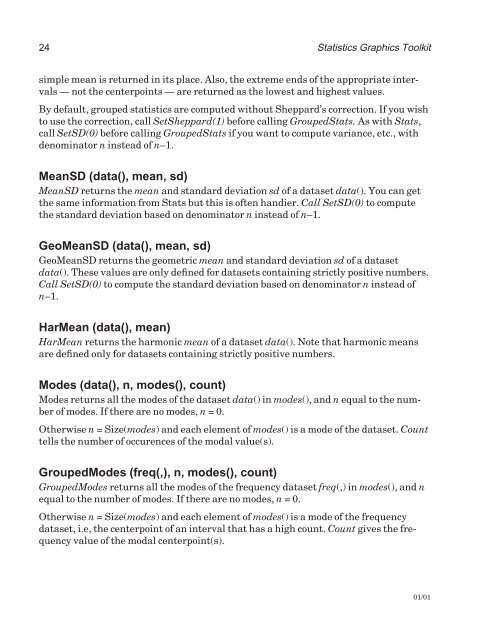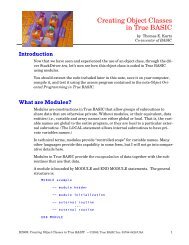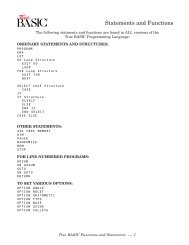Download the documentation - True BASIC
Download the documentation - True BASIC
Download the documentation - True BASIC
You also want an ePaper? Increase the reach of your titles
YUMPU automatically turns print PDFs into web optimized ePapers that Google loves.
24 Statistics Graphics Toolkit<br />
simple mean is returned in its place. Also, <strong>the</strong> extreme ends of <strong>the</strong> appropriate intervals<br />
— not <strong>the</strong> centerpoints — are returned as <strong>the</strong> lowest and highest values.<br />
By default, grouped statistics are computed without Sheppard’s correction. If you wish<br />
to use <strong>the</strong> correction, call SetSheppard(1) before calling GroupedStats. As with Stats,<br />
call SetSD(0) before calling GroupedStats if you want to compute variance, etc., with<br />
denominator n instead of n–1.<br />
MeanSD (data(), mean, sd)<br />
MeanSD returns <strong>the</strong> mean and standard deviation sd of a dataset data(). You can get<br />
<strong>the</strong> same information from Stats but this is often handier. Call SetSD(0) to compute<br />
<strong>the</strong> standard deviation based on denominator n instead of n–1.<br />
GeoMeanSD (data(), mean, sd)<br />
GeoMeanSD returns <strong>the</strong> geometric mean and standard deviation sd of a dataset<br />
data(). These values are only defined for datasets containing strictly positive numbers.<br />
Call SetSD(0) to compute <strong>the</strong> standard deviation based on denominator n instead of<br />
n–1.<br />
HarMean (data(), mean)<br />
HarMean returns <strong>the</strong> harmonic mean of a dataset data(). Note that harmonic means<br />
are defined only for datasets containing strictly positive numbers.<br />
Modes (data(), n, modes(), count)<br />
Modes returns all <strong>the</strong> modes of <strong>the</strong> dataset data() in modes(), and n equal to <strong>the</strong> number<br />
of modes. If <strong>the</strong>re are no modes, n = 0.<br />
O<strong>the</strong>rwise n = Size(modes) and each element of modes() is a mode of <strong>the</strong> dataset. Count<br />
tells <strong>the</strong> number of occurences of <strong>the</strong> modal value(s).<br />
GroupedModes (freq(,), n, modes(), count)<br />
GroupedModes returns all <strong>the</strong> modes of <strong>the</strong> frequency dataset freq(,) in modes(), and n<br />
equal to <strong>the</strong> number of modes. If <strong>the</strong>re are no modes, n = 0.<br />
O<strong>the</strong>rwise n = Size(modes) and each element of modes() is a mode of <strong>the</strong> frequency<br />
dataset, i.e, <strong>the</strong> centerpoint of an interval that has a high count. Count gives <strong>the</strong> frequency<br />
value of <strong>the</strong> modal centerpoint(s).<br />
01/01









